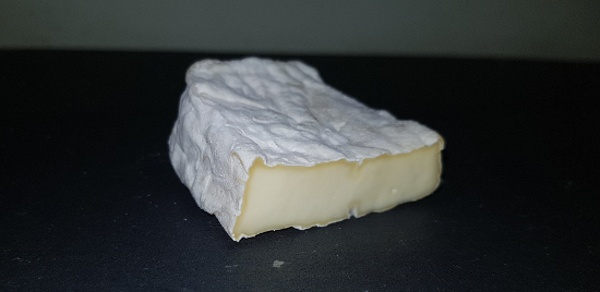Transitions
Exciting cheese changes. Thrilling Brexit transitions.
In my last post I described the cheese-making part of the course run by Flavour Tastings and held at the Kappacasein Diary.
And I described the cheese we made there. A kind of squeeky, fresh halloumi. Well, here's funny thing. I ate a bit of the cheese and then wrapped it in paper, and kind of forgot about it for a couple of weeks. When I unwrapped it, this is what the little chap looked like:

It's formed a pretty, white external mould, and the taste has matured to something very different from what it was a three weeks ago. It's really quite nice - a lactic sharpness and very mild mushroomy flavour. How has this happened? Well it must be because the milk contained some starter bacteria. The bacteria didn't play a big role in the separating the curds and whey - that was mainly the rennet, but because they are the right kind of bacteria, they've encouraged the white mould and the flavour to develop.
So some transitions are good. Some, though are less so. After having lured you into a false sense of cheesy security, I'm now going to hit you with some hardcore Brexitoid analysis. In particular, a bit more detail about the kinds of transition that we might expect.
In my previous posts about Brexit, here and here, I tried to characterise the different types of Brexit outcomes, and, under the assumption there is to be a transition period, the different types of transition. To summarise, these are the possible states of affairs after March 2019 (they are mutually exclusive):
- Article 50 has been revoked.
- We've gone straight to a final exit deal with no transition.
- We've left the union with no deal.
- The Article 50 period has been extended.
- We've begun a transition period.
And if we end up with the last of these possibilities, the types of transition are:
- Implementation period for final exit deal.
- Special deal for transition.
- EEA/EFTA membership.
- Standstill.
For reasons I've given in the previous posts, I think that we're going to end up with a standstill transition. That means that both the UK and the EU will have significant work to do in order to keep everything the same during that period. When the Article 50 process completes in March 2019 the UK will no longer be in the EU. So unless specific legal changes are made, obligations that had been mediated by EU law will cease to exist, and new relationships on the same terms cannot be created.
On the UK's side, this can be avoided by using the UK Withdrawal Bill. Effectively, this allows EU law to be copied and pasted onto the UK statute books.
On the EU side I had originally thought that the same approach was likely. Existing statutes could be copied and pasted into new laws which set-up the new temporary relationship of the EU to the UK. But a recent paper by Keneth Armstrong argues that this approach presents some legal difficulties. From a legal perspective it is really a version of the second type of transition listed above, a special deal for the transition, because the new legislation created by copying and pasting the old would be just that: new legislation; and a strong case can be made that Article 50 does not provide a sufficient legal basis for the creation of new legislation to that extent.
But there is an obvious alternative. Things can be arranged so that although the UK leaves the union in March 2019, not all treaty obligations end on that date. Instead, a substantial set of treaty provisions would continue to be in force for some specified period of time, each with a clearly defined date for its cessation.
So if the EU27 are discussing forms of standstill, as they agreed they would at the last European Council meeting, this is likely to be the proposal that they make at the next European Council meeting on 14th December. And that is still what I think is going to happen.
However I am less confident than I was a few weeks ago. The thing is that before the UK is allowed to discuss this we've supposed to have made 'sufficient progress' on Ireland, the divorce bill, and EU citizens rights. Right now, with just a few weeks to go, this is not looking good, with the Irish question looking particularly fraught. This is just crap - we're alienating our closest neighbours and endangering peace. The consequences of Brexit are not just economic.
And if we don't get our act together in time for the December council meeting, we're very likely to have run out of time for anything other than crashing out of the EU with no-deal. This might delight disaster capitalists such as Legatum currently driving government policy. For the rest of us, it's not so good.
Comments